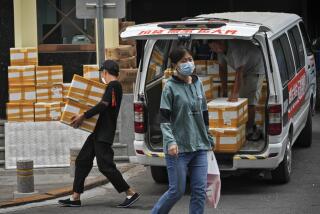Free Flow of Goods Expected to Slow
- Share via
The world economy is in a fragile state, according to U.S trade figures, and is likely to slow further as additional security measures triggered by last week’s terrorist attacks hinder the flow of goods and services.
In July, U.S. exports plummeted by $2.1 billion to $83.7 billion, the largest monthly drop ever recorded, and imports declined for the fourth straight month to $112.6 billion, the Commerce Department reported Wednesday. The report confirmed that health of the global economy was in a perilous state before the Sept. 11 hijackings.
Even the slight narrowing in the July trade deficit to $28.8 billion wasn’t cause for optimism, because it reflected a sharp contraction in U.S. purchases of foreign goods rather than a boost in overseas sales. America’s trade deficit with Western Europe nearly doubled to $8.6 billion and U.S. sales to Japan also declined sharply, pushing that bilateral trade imbalance to $5.93 billion.
With U.S. officials still evaluating the vulnerabilities created by America’s open borders, experts said it is too early to know how much the global financial and trade networks will be changed by the tragedy. Investigations of money-laundering, immigration and terrorist networks could result in policies that could curtail how money, people and goods flow across borders.
But there is little doubt that an already-weakened economy will deteriorate further as the events of the last week ripple around the globe in the form of shrinking stock prices, canceled orders, fewer travelers, shipping delays and growing transportation costs.
Peter Morici, a senior fellow at the Washington-based Economic Strategy Institute, calculates that the increased security measures and the resulting slowdown in parts moving to factories could cost the $14-trillion U.S. economy as much as one-half of 1% of the gross domestic product.
“It’s not just the security measures, it’s all the slowdown in productivity from people waiting in line and waiting to move goods,” he said.
The tens of thousands of layoffs announced by U.S. airlines and Boeing Co., the nation’s leading exporter, in the last week reflect the belt-tightening already underway.
More stringent inspections at the U.S.-Canada border have caused parts shortages for Ford Motor Co. and General Motors Corp., whose just-in-time manufacturing system depends on a free flow of goods between plants in both countries. Asian subcontractors claim millions of dollars in losses because U.S. air shipments were grounded for days and they now face stepped-up security inspections and rising transportation costs.
“One of the gains of just-in-time manufacturing is you turn your pipeline into inventory and you don’t have to stock up on parts and components because the flow is so monitored and regulated,” Morici said.
That is exactly what worries executives such as Charlie Woo, chief executive officer of Los Angeles-based Megatoys Inc., which imports several thousand containers of toys and specialty goods a year across the Pacific.
“I’m really concerned about how things unfold, how the movement of international goods will be impacted,” he said. “If you have more inspections, more scrutiny, the system will slow down.”
Martin Regalia, chief economist for the U.S. Chamber of Commerce, is confident that the U.S. government will shore up the airlines and ensure that enhanced security measures don’t drastically impede the movement of goods. “I don’t see where our production or logistical process will be in any way damaged,” he said.
Regalia warned, however, that consumer confidence has suffered a “body blow” and is unlikely to recover soon, which will mean less trade overall. That is bad news for Asian and Latin American economies that were counting on the U.S. to pull them out of their downward spiral.
“Big exporters to the U.S. are going to find their economies slow because we’re not buying their goods,” he said.
The global downturn will be further exacerbated by rising commodity and oil prices, said William Belchere, chief Asia strategist for Merrill Lynch in Singapore.
“I think it will be enough to put the U.S. economy into recession and perhaps the global economy into recession for the first half of next year,” he said.
The Japanese were counting on a quick turnaround in the U.S. economy to help them from sliding further into recession, said Kei Matsuda, chief economist at Union Bank of California in San Francisco. “They don’t think they can jump-start their own economy,” he said. After last week’s attacks, several groups of Japanese business people canceled visits to the U.S. because of security fears, which means lost business opportunities and tourism revenues.
“As long as America is perceived to be a somewhat unsafe place to visit, it will have a significant impact on California tourism,” he said.
More to Read
Inside the business of entertainment
The Wide Shot brings you news, analysis and insights on everything from streaming wars to production — and what it all means for the future.
You may occasionally receive promotional content from the Los Angeles Times.










